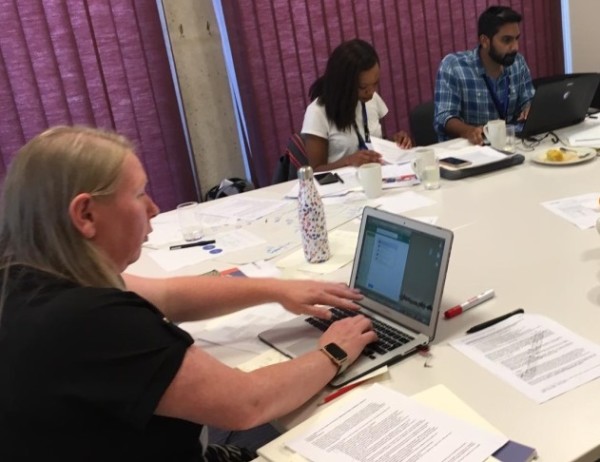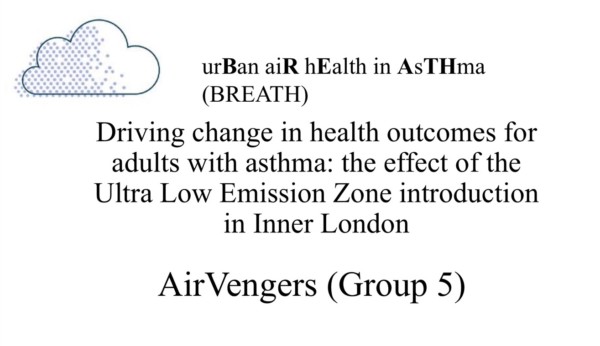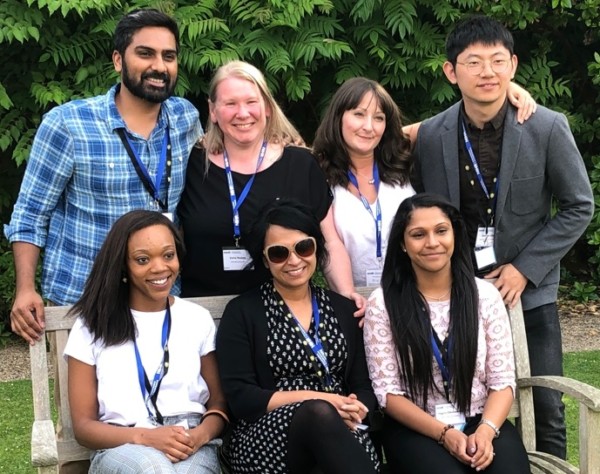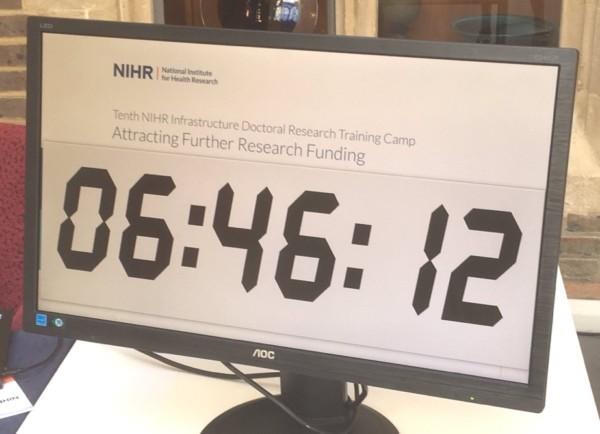Investing in the future – training the next generation of Manchester BRC researchers
Putting together successful funding applications – a key aspect of a research career – has been the focus of two recent NIHR training events involving Manchester BRC-funded PhD students and clinical fellows.
An important element of Manchester BRC’s remit is to help the next generation of researchers acquire the knowledge and skills to undertake high quality experimental medicine and translational research.
Among its activities, Manchester BRC endorses attendance at the national NIHR Infrastructure Training Camp, an annual 3 day training event for invited early career researchers from NIHR supported bodies.

This year, Celia Hulme, a second year doctoral student in the Hearing Health Theme, was selected to represent Manchester at the event in early July. For her PhD Celia is researching ‘improving patient experience, service access and outcomes for deaf adults who use British Sign Language’.
Celia (pictured left at the camp), herself a Deaf British Sign Language user, shares her takeaway tips and experiences from the camp later in this article.
“The national camp is a great learning opportunity, but attendance from individual NIHR organisations is limited” said Professor Georgina Moulton, Manchester BRC’s Training Lead. “However, as the skills learnt there are so valuable, I am pleased to say that we now run our own condensed version of the camp, facilitated by a highly experienced local team. A pipeline of well-trained researchers is one priority for ensuring the sustainability of high impact research which improves patients’ health outcomes.”
The first, day-long Manchester training camp, held at the end of June and chaired by Professor Anne Barton, the MSK Theme Lead, hosted 12 learners from across the themes.
Like their colleagues at the national camp, they had the timed challenge of working in teams to compile and present a grant application to an expert panel. The event had input from professionals in PPIE, research support, learning and development, and statistics.
Professor Barton, a NIHR Senior Investigator and frequent mentor at the national event, said “A research career will only go forward with successful funding applications. However, submitting an application is complex with many elements to be considered – scope, budgeting, PPIE, etc. It is essential to learn what to consider and the workable approaches early on.”
Manchester BRC’s first capacity building workshop: participants’ feedback
Alex Oldroyd: Clinical Research Fellow – MSK Theme
“I now appreciate the importance of early planning, delegation and frequent checking in with other team members. It was great to see how experts in finance, statistics and PPIE could enhance our project in such focused ways in such a short space of time. I would certainly recommend anyone to attend any future training camps; it has given me the confidence to write future grant applications.”
Mikey Lebrett: PhD student – Cancer Prevention and Early Detection Theme
“I thought the training camp was great, I really enjoyed it. I am much less wary of the idea of a grant application now, and picked up some really useful tips and contacts.”
National NIHR Infrastructure Training Camp
Celia’s takeaway tips
“If you get the chance to attend a training camp on how to do early career applications, grab the opportunity with both hands.”
- Before you start on your research idea, ideally contact successful applicants in your field to find out their journey; pitch your idea and area of research to your peers and PPI representatives. Communicate your proposal as much as possible to help shape your research idea and design.
- When framing your research question, think about it being cutting edge with low risk; find the gap; provide enough preliminary data to show you can do it and make it as easy as possible for the reviewer to read.
- Every research project must now imbed Public Patient Involvement (PPI) plans in their application. Weave PPI throughout the application, be realistic with what you can do and use the INVOLVE PPI cost calculator to support your budgeting.
- Make use of the NIHR Research Design Service (RDS) when planning and designing your research. They are there to help you submit high quality applications.
- Take time and effort on the plain English summary and seek feedback from patients, carers or colleagues to find out if anything is unclear.
- When costing a research budget, consider the funder’s remit, timeframe, accuracy and completeness, research plan, risk and who is hosting the project, as costs are slightly different between a university and NHS host.
- When presenting to a panel, think about how you enter the room as impact starts immediately as you walk through the door. When presenting your research, start with a story. The panel is mainly focusing on your voice and body language, it is important to get the wording and pacing right to keep their attention.
- NIHR has excellent resources on training, career progression and grants.


What to expect at the camp – Celia’s summary

Day 1:
- Masterclasses on framing the research question, finances, how to include patient and public involvement (PPI) in research and presentation skills.
- Allocated to a team at the end of the day. We called ourselves ‘AirVengers’ as our research topic was linked to air pollution.
Day 2:
- Very intense day, with deadlines (the main office had a countdown clock!) and meetings.
- Communicating information from the meetings to the team, as well as working on your own sections of the application.
- Really tests everything about teamwork, especially how to communicate and work together under pressure.
Day 3:
- Team presentation to the research panel with individual critiques.
- Critiques are designed to improve your persuasive skills and help you learn how to respond quickly to difficult questions.
Read Celia’s blog about her PPI work with the Deaf British Sign Language (BSL) community.